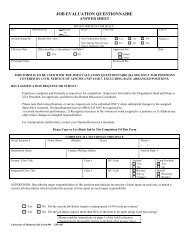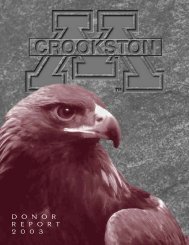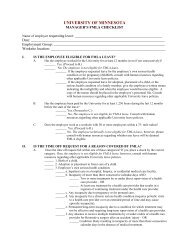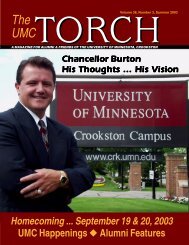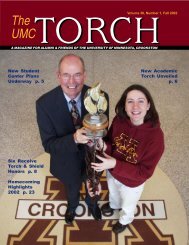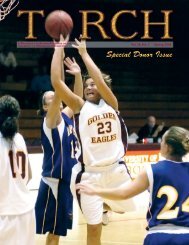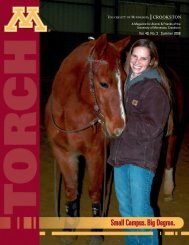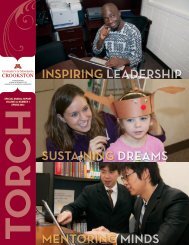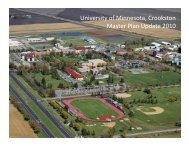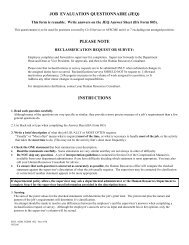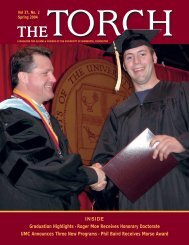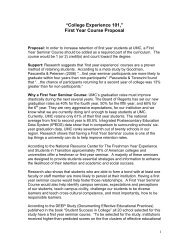Tuition Refund Appeal Committee Policy - University of Minnesota ...
Tuition Refund Appeal Committee Policy - University of Minnesota ...
Tuition Refund Appeal Committee Policy - University of Minnesota ...
You also want an ePaper? Increase the reach of your titles
YUMPU automatically turns print PDFs into web optimized ePapers that Google loves.
TUITION REFUND APPEAL POLICY AND PROCEDURES<br />
UNIVERSITY OF MINNESOTA, CROOKSTON<br />
Students may appeal for an exception to the <strong>University</strong> refund policy if unusual circumstances exist. The<br />
student must complete a Retroactive Course Cancellations and <strong>Tuition</strong> <strong>Refund</strong> <strong>Appeal</strong>s<br />
form if there are extenuating<br />
circumstances that have prevented the student from dropping his or her semester course work and warrant<br />
exception to the refund procedure. All tuition refund petitions, written and signed by the student, and<br />
accompanied by supporting, <strong>of</strong>ficial third-party documentation, are to be submitted to the Office <strong>of</strong> the<br />
Registrar. In order for an appeal to be considered, the student must prove extenuating circumstances were<br />
the sole cause <strong>of</strong> withdrawal from classes. The responsibility to supply adequate supporting<br />
documentation lies with the student. If the student is requested to provide additional documentation in<br />
order for the <strong>University</strong> to make a final decision, the student will have 30 days to submit the additional<br />
documentation or the appeal will be denied. The <strong>Committee</strong> will typically only consider appeals written<br />
and submitted by the student; appeals submitted by someone other than the student (e.g., parent, guardian,<br />
sibling, etc.) will typically not be considered. <strong>Appeal</strong>s should fully explain the extenuating circumstances<br />
and include supporting documentation. The submission <strong>of</strong> an appeal does not guarantee approval.<br />
The Registrar decides routine appeals that meet established criteria. <strong>Appeal</strong>s that fall outside existing<br />
criteria, and appeals <strong>of</strong> Registrar decisions, are referred to the <strong>Tuition</strong> <strong>Refund</strong> <strong>Appeal</strong> <strong>Committee</strong> (TRAC)<br />
for review. Students who wish to appeal the decision <strong>of</strong> the Registrar must do so in writing within 10<br />
calendar days after receiving the decision. The <strong>Tuition</strong> <strong>Refund</strong> <strong>Appeal</strong> <strong>Committee</strong> will then review such<br />
appeals.<br />
The TRAC is an administrative committee appointed by the Chancellor and comprised <strong>of</strong> representatives<br />
from the Business Office, Student Affairs, and Financial Aid and Scholarships. The committee is chaired<br />
by the Registrar who serves without a vote. TRAC meetings are typically held on the third Thursday <strong>of</strong><br />
each month. <strong>Appeal</strong>s are reviewed in the order received. <strong>Appeal</strong>s must be received no later than the first<br />
Thursday <strong>of</strong> the month to be reviewed at that month’s meeting. <strong>Appeal</strong>s submitted after that date would<br />
be reviewed at the following meeting. Students will receive written or e-mail confirmation that his/her<br />
appeal form has been received. The confirmation will inform the student <strong>of</strong> the date on which the<br />
<strong>Committee</strong> will review the appeal.<br />
The Office <strong>of</strong> the Registrar will prepare a packet <strong>of</strong> information that includes the student’s petition and<br />
documentation, academic history, current semester’s schedule, student account balance, and the financial<br />
aid status for the student. The <strong>University</strong> may contact third-party documentation providers to verify<br />
information provided by the student. The <strong>Committee</strong> may also contact the student’s instructor(s), adviser,<br />
department head, and/or any other university personnel and to inquire as to attendance record, current<br />
grade in the course(s), assignments completed, or other university interactions as they relate to the appeal<br />
request. Materials are confidential and shared only with members <strong>of</strong> the <strong>Committee</strong> who review the<br />
appeal. The TRAC will research, review, and render a decision to the request. <strong>Appeal</strong>s are approved by a<br />
majority <strong>of</strong> the committee voting in favor <strong>of</strong> the request. Once the <strong>Committee</strong> has reached a<br />
determination, the student will receive a letter or e-mail within seven working days indicating the<br />
<strong>Committee</strong>’s disposition <strong>of</strong> the appeal.<br />
The <strong>Committee</strong> will NOT typically consider appeals based on the following reasons:<br />
1. Registering for the wrong course. It is the student’s responsibility to verify accuracy <strong>of</strong> course<br />
prerequisites or required courses, course schedules, required texts or other supplies, course<br />
content and appropriateness <strong>of</strong> course level, catalog requirements, and registration.<br />
2. Any case that involves a protested check or any account that has been turned over to a<br />
collection agency or the state <strong>of</strong> <strong>Minnesota</strong>.
3. Misinterpretation, lack <strong>of</strong> knowledge, understanding, or failure to follow applicable <strong>University</strong><br />
policies and procedures as published in the <strong>University</strong> Catalog, Class Schedule, <strong>of</strong>ficial<br />
<strong>University</strong> website , or other applicable <strong>University</strong> publications.<br />
4. Dissatisfaction with course content or delivery <strong>of</strong> instruction.<br />
5. Dissatisfaction with academic progress in course.<br />
6. <strong>Appeal</strong>s <strong>of</strong> non-refundable fees.<br />
7. Non-attendance or minimal attendance <strong>of</strong> class.<br />
8. Inadequate investigation <strong>of</strong> course requirements prior to registration and attendance.<br />
9. Non-qualification, late application, or loss <strong>of</strong> eligibility for financial aid or scholarships.<br />
10. Non-receipt <strong>of</strong> mail due to obsolete address on file with the Office <strong>of</strong> the <strong>University</strong> Registrar.<br />
11. Failure to activate or maintain the student’s <strong>of</strong>ficial UMN.EDU e-mail account (e-billing).<br />
12. Changes <strong>of</strong>, or personal conflicts with, the instructor <strong>of</strong> record.<br />
13. Student errors resulting in the delay <strong>of</strong> administrative processes relative to registration or the<br />
delivery <strong>of</strong> financial aid funds.<br />
14. Voluntary acceptance <strong>of</strong> employment or other activity influencing ability to attend classes.<br />
15. Textbook, s<strong>of</strong>tware, hardware, or technical difficulties.<br />
16. Routine illness.<br />
17. Lack <strong>of</strong> preparation or failure to meet course prerequisites.<br />
18. Vacation plans.<br />
19. Personal errors in judgment or irresponsibility involving transportation, childcare, availability<br />
<strong>of</strong> finances, academic ability, and time management.<br />
If a student has documentation that substantiates an extraordinary event and an appeal for tuition and fee<br />
refund is approved, the student must understand that the <strong>University</strong> is only able to approve a refund<br />
appeal once during the entire academic career at UMC (includes all voluntary and involuntary<br />
separations). In particular, if the event is related to a medical condition, it is the student’s responsibility to<br />
make an informed decision (which may require a consultation with a health care provider) prior to<br />
enrolling in future coursework since an appeal is granted on a one-time basis for a given medical<br />
condition. While a student may not be granted a second tuition and fee refund the student may have the<br />
opportunity to withdraw from coursework with a grade <strong>of</strong> W in future semesters, assuming the student<br />
meets all appropriate deadlines and regulations related to withdrawal.<br />
The <strong>Tuition</strong> <strong>Refund</strong> <strong>Appeal</strong> <strong>Committee</strong> does not review tuition refund exceptions when the basis <strong>of</strong> the<br />
appeal is related to the academic delivery, instructor conflicts, grading, or any academically related<br />
request for refund exception. Any and all academic grievances must follow the UMC Student Grievance<br />
Procedures .<br />
Financial Aid Recipients Note: If an appeal is approved for a recipient <strong>of</strong> federal and/or state financial<br />
aid (grants and loans), and the student’s original course registration is cancelled and/or tuition liability is<br />
eliminated as a result; federal/state regulations dictate that all financial aid previously applied to the<br />
student’s account and/or disbursed to the student in the form <strong>of</strong> an overpayment refund, must be returned<br />
to the respective loan/grant program. This action may result in an outstanding balance on the student<br />
account; in certain scenarios, that (new) balance owed may be in an amount greater than was incurred via<br />
the initial registration/aid disbursement.<br />
-- Approved by Chancellor’s Administrative Cabinet, November 22, 2010<br />
Revised June 28, 2012; March 25, 2013; August 26, 2013



